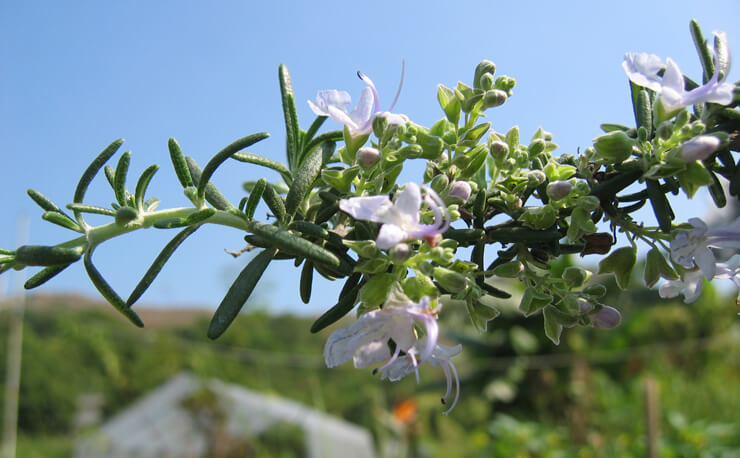Rosemarinus Officinalis or the humble Rosemary is a herb of the small shrub. It is evergreen, with thick leaves of a strong aroma. The blooms are pale blue seen during the winters and the early stage of spring. Rosemary is a native herb of the Mediterranean that can now be seen cultivated on a global basis. Rosemary Leaf Extract is beneficial for treating minor physical issues. There are two other types of Rosemary which are wild or marsh rosemary and bog rosemary. The leaves of the Rosemary plant are needle-shaped with colors like white, blue, or pink. It is also known as the dew of the sea.
The uses of rosemary
Rosemary is used as a spice for cooking. According to the tradition, an efficient mistress of the household only can hold the rosemary cultivation. Other uses of the plant include its addition to medicine, makeup items, and essential oils. The Rosemary Leaf Extract is a known abortive, and women use it to promote the flow of menstruation. Cosmetic lotions and hair oil infuse the extract of the leaves for the promotion of hair growth.
Other uses of the rosemary extract
Rosemary has an anti-bacterial quality which makes it great as an anti-septic element. Rosemary Leaf extract is used in medicated lotions to repel ticks, fleas, and other such parasites in pets. Rosemary extract also has antifungal and antiviral properties, and it is also used to kill the bacteria that infect raw meat to spoil it.
Rosemary in global cancer and health research
Many reports are available in the research world that analyze the anti-cancer properties and effects of rosemary. Rosemary is believed to be inducing an anti-cancer enzyme. Rosemary has polyphenols that inhibit metabolically activating procarcinogens. Rosemary is also believed to decrease the permeating capacity as well as the fragility of capillaries. The plant also has spasmolytic actions and is believed to increase immunity. Rosemary treats headaches, reduces stress, and aids asthma and bronchitis. Rosemary also has anti-oxidative actions. It has greater potential than vitamin E. The research going on with Rosemary Leaf Extract is promising indeed and needs more clinical testing for a validating result. Rosemary is also said to cure blood pressure if taken in a minimal amount daily.
The side effects of rosemary
The dosage of large quantities of rosemary may induce digestive problems, irritation of the intestines, and even a damaging effect on the kidneys. Allergic dermatitis is reported, but generally, it is not taken as a skin sensitizer for human skin. Large doses can even cause seizures. Excessive ingestion of rosemary oil can even cause toxication.
Rosemary in legend
The Greek goddess Aphrodite was believed to have rosemary draped around her when she came out of the sea. Mother Mary is also said to have spread her blue cloak on a white bloom rosemary bush and it turned blue, creating the Rose of Mary.
As a decorative
Rosemary has pest-controlling properties, so it is used by various people who take the rosemary to decorate their houses.
Places of cultivation
Rosemary needs less water for growth. It is also tolerant of drought. Rosemary is known to thrive in loam soil with a sunny position and an efficient drainage system. It has average fertility.
Use of other parts
The Rosemary Leaf Extract contains essential oil flavonoids, saponins, and tannins. The plant is rich in iron, calcium, and vitamin B6. Rosemary cures premature balding and even aids new hair growth. The extract can be infused with shampoos to fight dryness, itchiness, and dandruff on the scalp. As a pest and insect repellant, it is placed close to the wardrobes and dressers to keep the flies away.
Uses in the research of Alzheimer’s and other neurological diseases
Rosemary Leaf Extract has a good reputation for boosting brain memory. Various studies claim that Rosemary has some cancer-fighting acid that shields the brain from free radicals and hence decreases the danger of life-threatening phenomena like stroke, dementia, and also Alzheimer’s, and Lou Gehrig’s disease. Rosemary also has a reputation for the easy digestion of starchy foods and vegetables thus enhancing the internal health of the stomach.








